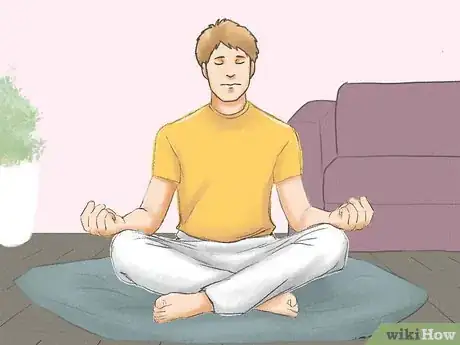This article was co-authored by Chad Herst, CPCC. Chad Herst is the Executive Coach at Herst Wellness, a San Francisco-based wellness center focused on Mind/Body Coaching. Chad is an accredited Co-Active Professional Coach (CPCC) and he has been working in the wellness space for over 19 years, with experience as a yoga teacher, acupuncturist, and herbalist. He received his BA from Columbia University and his MS in Traditional Chinese Medicine from the Pacific College of Oriental Medicine.
This article has been viewed 42,049 times.
Maintaining a positive attitude has benefits on your physical and mental health, but it can be difficult to maintain a positive attitude when other people are negative. The best way to maintain your positive outlook when faced with negative people is to stay focused on yourself and to cultivate a resilient mindset.
Steps
Choosing to Remain Positive
-
1Remember that you are in charge of your attitude. The first step in staying positive is to remember that no one can make you feel bad without your permission. If you choose to remain positive, you can do it. Don't allow yourself to fall into the trap of feeling like a victim of another person's bad attitude.
- You might have to remind yourself of this frequently when you're around negative people for any length of time.
- Take breaks when you need to. Stepping outside for a moment, going to the restroom, or taking a quick walk are all ways you can maintain your positive attitude.
-
2Focus on yourself. If all your attention is on the negative person, you'll be more likely to be sucked into their negativity. By paying attention to what you can do to maintain your positivity, you'll be more likely to create a distance between yourself and the other person. After all, you can't change the other person, but you can change yourself.
- Don't worry what the negative person might think of you if your priority is to maintain your own happiness.
- You won't be able to change their attitude, so don't waste your energy trying.
Advertisement -
3Value your own thoughts and feelings. If you're paying attention to your own thoughts, you won't allow a negative person to disregard them. The more you learn to value your own experiences, the less you're likely to worry what others think of you.
- Instead, focus on the opinions and ideas of positive people, people who you'd like to emulate in your own life.
- If you're engaged in the topics that interest you, you're unlikely to have time to pay attention to the negative people around you.
-
4Use a mantra or phrase. Some people practice saying short mantras as a spiritual tool, while others find mantras remind them to calm down under stress. Repeating a mantra to yourself when in the presence of negative people can help you remain positive.
- The mantra that's meaningful to each person is highly individual. Some people chant words from sacred traditions, while others prefer simple words or phrases.
- An example of a mantra might be: “I am enough," or the Buddhist, "Om mani padme hum."
- Pairing mantra with your breath is a strong counterbalance to incoming negativity.
-
5Avoid negative people when possible. Seek out positive people, and make sure to try to limit your time around negative people whenever you can. When you can't avoid spending time around negative people, try to make sure you're meeting in a group of people rather than just the two of you.
- If you're friends on social media, unfriending or unfollowing the posts of the negative person is one way to minimize your contact with the person.
- If there are events you have to attend with the negative person, go into them with as much positivity as you can. Take breaks as often as you need to.
-
6Talk to someone about the situation. Talking to someone who is able to see the situation with fresh eyes might help you understand the situation better. This can help you learn new ways to stay positive, and may reveal information about the negative person's outlook that could help you.
- It's best if the person is impartial - that is, not someone who's a friend of the negative person, or a friend who's too close to you.
- Some people benefit from talking to a therapist or counselor. If you're someone who finds herself constantly surrounded by negative people, there may be something in your own life that you can address.
-
7Track your triggers. Being aware of the things that threaten your positivity will help you recognize what's bothering you about a negative person. Notice the things that make you feel instantly bad, angry, or upset. It might be a particular comment about a sensitive topic, or it might be something that reminds you of the way your mother used to criticize you.[1]
- Developing more knowledge about yourself will help you avoid falling into negativity traps.
- You might notice that the more you learn about why you react to these negative comments, the less they'll bother you.
-
8Avoid gossiping about others. One of the many ways that a negative person will attempt to engage you is by talking badly about others. Remember that you wouldn't want another person talking about you that way, and avoid these conversations.
- If someone tries to draw you in, simply redirect the conversation.
- If you can't change the conversation, it's okay to leave it. You can make up an excuse to leave, or you can simply explain that you don't want to talk more about it.
-
9Tune out negativity. Don't take on another person's negative mindset. When you find yourself having to deal with someone else's negativity, increase your attention to the positive.[2]
- It's not important whether or not the negative person disagrees with your point of view. It will help your own attitude to not care what the negative person thinks!
- Remember that positivity is contagious - your own attitude might uplift your negative friend.
Increasing Your Own Positivity
-
1Notice if you're filtering out positive information. One of the most common ways to practice negative self-talk is by focusing on negative parts of a situation and leaving out the positive ones. If your inner attention seems preoccupied with what you've done wrong, you're likely engaged in negative self-talk.[3]
- Try redirecting your attention to something that's gone well, or something you're pleased with.
- Don't say anything to yourself that you wouldn't say to another person you loved. If you find yourself doing this, interrupt the thought, and consider what you might say instead. Practice being kind to yourself.[4]
- Practice receiving compliments by saying "Thank you," rather than acting as if you didn't deserve it.
-
2Pay attention to your thoughts. Set a timer to go off at random intervals, and when it goes off check to see if your thoughts are mostly positive or negative. If the latter, try to find a way to see the topic in a positive light.[5]
- It will be helpful to remember that developing resilience takes time. You'll improve with more practice.
- Be patient with yourself.
-
3Enjoy laughing. Having a good sense of humor is a sign of resilience and positivity. Look for the humor in everyday affairs, and find new ways to laugh. If you can laugh, remaining positive around negative people will become a great deal easier.[6]
- Laughter starts with not taking yourself too seriously.
- You might even try "laughter yoga" which combines laughter with yogic breathing. It is being developed as a means to encourage playfulness, an important quality in emotional intelligence and resilience.
- Even just smiling releases the chemical serotonin, which will make you feel better.
-
4Take time every day to center yourself. When you wake in the morning, take the opportunity to remind yourself of what you're looking forward to in the day. Write a gratitude list, or keep a gratitude journal.
- If you belong to a spiritual tradition, saying morning prayers or meditations might be helpful.
- This practice can also be done at night if you're more of a "night owl." Or, you might try doing some centering acts in the morning, and others in the evening.
- You may return to your gratitude list, your meditations or other practices throughout the day if you need to.
-
5Look for the positive qualities in everyone you meet. No matter how negative a person may seem to be, it's unlikely that she doesn't have any positive qualities. Rather than dwelling on the aspects of the person you don't like, find ways to appreciate parts that you do.
- Perhaps what might, at first, seem to be negativity is fear and anxiety, and an opportunity to practice compassion.
- Even being courteous and polite to a negative person might change your ideas of him.
-
6Follow a healthy lifestyle. Staying physically fit, getting plenty of exercise, and following a balanced diet are all part of living with emotional resilience. Exercising at least 20-30 minutes, 3 times per week, will positively affect your mood and reduce your stress level.[7]
- When you're hungry or tired, you're less likely to be able to practice resilience.
- Getting enough sleep is also part of a healthy lifestyle. Most adults do best on 7-8 hours of sleep per night, while teenagers often need 9-10 hours.
-
7Try to refrain from judgment. What you perceive as negativity might just someone who's expressing different values from your own. If you can listen to another person's perspective with an open mind, you might find yourself learning something new.[8]
- Sometimes an attitude that seems negative might be the person's way of expressing concern.
- If you approach another person's perspective with curiosity, he'll be more likely to respond in the same manner.
Expert Q&A
Did you know you can get expert answers for this article?
Unlock expert answers by supporting wikiHow
-
QuestionHow can I be calm and less reactive?
 Chad Herst, CPCCChad Herst is the Executive Coach at Herst Wellness, a San Francisco-based wellness center focused on Mind/Body Coaching. Chad is an accredited Co-Active Professional Coach (CPCC) and he has been working in the wellness space for over 19 years, with experience as a yoga teacher, acupuncturist, and herbalist. He received his BA from Columbia University and his MS in Traditional Chinese Medicine from the Pacific College of Oriental Medicine.
Chad Herst, CPCCChad Herst is the Executive Coach at Herst Wellness, a San Francisco-based wellness center focused on Mind/Body Coaching. Chad is an accredited Co-Active Professional Coach (CPCC) and he has been working in the wellness space for over 19 years, with experience as a yoga teacher, acupuncturist, and herbalist. He received his BA from Columbia University and his MS in Traditional Chinese Medicine from the Pacific College of Oriental Medicine.
Mindfulness Coach
-
QuestionHow can I be more kind to myself?
 Chad Herst, CPCCChad Herst is the Executive Coach at Herst Wellness, a San Francisco-based wellness center focused on Mind/Body Coaching. Chad is an accredited Co-Active Professional Coach (CPCC) and he has been working in the wellness space for over 19 years, with experience as a yoga teacher, acupuncturist, and herbalist. He received his BA from Columbia University and his MS in Traditional Chinese Medicine from the Pacific College of Oriental Medicine.
Chad Herst, CPCCChad Herst is the Executive Coach at Herst Wellness, a San Francisco-based wellness center focused on Mind/Body Coaching. Chad is an accredited Co-Active Professional Coach (CPCC) and he has been working in the wellness space for over 19 years, with experience as a yoga teacher, acupuncturist, and herbalist. He received his BA from Columbia University and his MS in Traditional Chinese Medicine from the Pacific College of Oriental Medicine.
Mindfulness Coach
Warnings
- Developing negative patterns of thinking can directly affect your health. If you find yourself falling into habits of negative thinking, take steps to address this.⧼thumbs_response⧽
References
- ↑ https://www.psychologytoday.com/blog/focus-forgiveness/201405/how-stay-happy-around-negative-people
- ↑ http://addicted2success.com/life/2-ways-to-stay-positive-when-dealing-with-negative-people/
- ↑ http://www.mayoclinic.org/healthy-lifestyle/stress-management/in-depth/positive-thinking/art-20043950?pg=2
- ↑ Chad Herst, CPCC. Mindfulness Coach. Expert Interview. 22 March 2019.
- ↑ http://www.mayoclinic.org/healthy-lifestyle/stress-management/in-depth/positive-thinking/art-20043950?pg=2
- ↑ http://www.mayoclinic.org/healthy-lifestyle/stress-management/in-depth/positive-thinking/art-20043950?pg=2
- ↑ http://www.mayoclinic.org/healthy-lifestyle/stress-management/in-depth/positive-thinking/art-20043950?pg=2
- ↑ http://addicted2success.com/life/2-ways-to-stay-positive-when-dealing-with-negative-people/











































































